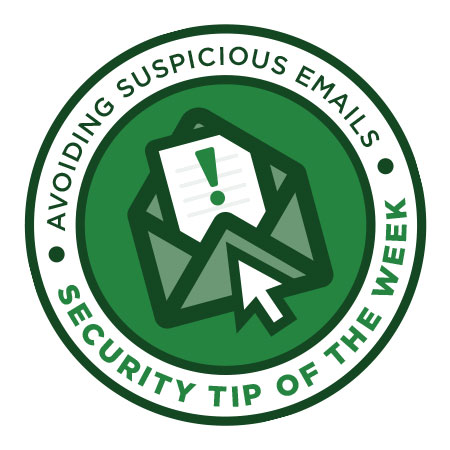
Phishing occurs when fraudsters trick users into revealing personal information via illegitimate web sites in order to steal private information. Social security numbers, driver’s licenses, credit card information, or bank account information are especially susceptible to phishing and identity theft.
Phishing is a very devious form of scamming that oftentimes goes undetected! Below are some very simple ways to avoid fraudulent links that may threaten your online security and information safety.
-
Be generally suspicious of e-mails coming from unrecognized parties and any links to outside websites that accompany these messages. One way to look for suspicious e-mails is to note any misspellings or overuse of non-alphabetic characters. As a rule-of-thumb, unless you are familiar with the sender of the email, do not click on unfamiliar links.
-
Avoid any threatening or time-sensitive e-mails. One red flag for phishing occurs when an e-mail threatens to close your accounts unless you update your information or log-in. Rather than act responsively to these e-mails, manually go to your mobile banking or account website and log-in as you would, without clicking any links within the suspicious e-mail.
-
Do not provide information over the phone to calls that you receive. Rather, hang up and give your account service representatives a call to ensure that you are connecting over a secure platform and are speaking with a legitimate representative. To further maintain a secure and deep connection, visit your local institutions! Familiarity with your local banking representatives provide confidence in your security and the transfer of information between each party.
-
Protect your computer with a firewall, spam filter, anti-virus and anti-spyware software. A little bit of research will help in choosing up-to-date programs that are effective with your operating system.
-
Never send personal information over e-mail or text message, even to personal friends or relatives. E-mail is very easy to hack by outside parties. Financial institutions and other companies that deal with sensitive information have security systems in place to ensure that their websites and log-in portals are encrypted and strong against any potential hacker. Regular e-mail and text message accounts do not have such encryption. The best way to securely transfer private information to trusted friends or family is in person or over the phone.
QUESTIONS?
Reach out to us to learn more about the services we offer.
1-855-BANK-MAG
